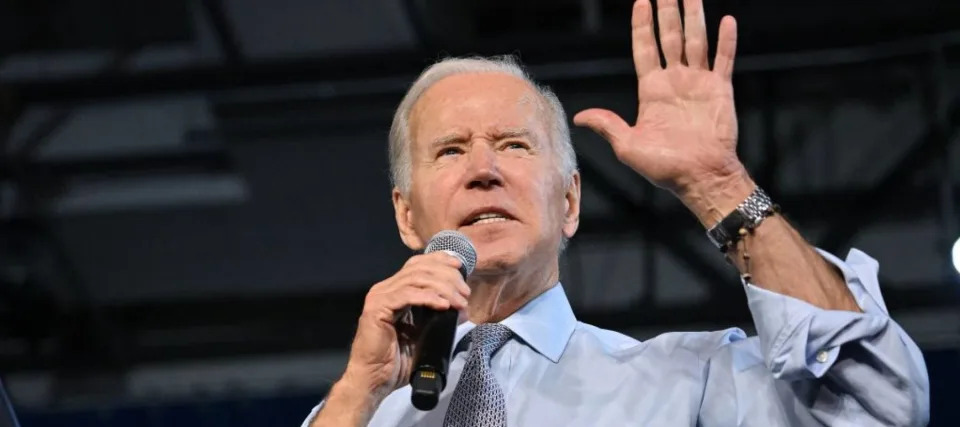FORTY YEARS OF GOP CUTS
The IRS says its 87,000 new hires could help collect as much as $1 trillion by forcing rich tax cheats to pay up — but will more 'fire-breathing dragons' really do the trick?
Get ready, ultra-wealthy Americans: President Joe Biden wants you to start paying your share.
Through the Inflation Reduction Act, Biden plans to increase funding for the IRS to help the agency catch sneaky tax evaders — especially those high-earners who love to find loopholes around the law.
A Treasury Department report from May 2021 estimates the extra money would allow the agency to hire around 87,000 new employees — which could include revenue agents and customer service and IT staff — by 2031.
Advocates believe the increased funding could raise as much as $1 trillion by forcing tax cheats to pay their dues, especially after years of budget cuts have gutted the system.
However some critics worry the increased scrutiny on taxpayers could backfire in a big way.
Don't miss
Better than NFTs: You don't have to be ultra-rich to own a piece of a Pablo Picasso. Here's how to enter the fine art market
'Hold onto your money': Jeff Bezos says you might want to rethink buying a 'new automobile, refrigerator, or whatever' — here are 3 better recession-proof buys
Americans are paying nearly 40% more on home insurance compared to 12 years ago — here's how to spend less on peace of mind
The IRS desperately needs the support
The $80 billion in funding spread over the next 10 years will help the IRS modernize its infrastructure, increase enforcement and replace its aging workforce (50,000 of the IRS’s 80,000 workers are expected to leave in the next five years).
The agency has reportedly been underfunded by about 20% for a decade — leading it to cut back on both staff and technology updates.
Bogged down by a processing system that’s more than half a century old and a backlog that includes millions of unprocessed paper filings, the IRS has been in need of more resources and support for a while.
The customer service department has been woefully short-staffed as well. During the 2022 filing season, the IRS received around 73 million phone calls from taxpayers — but only 10% were actually answered.
Read more: The 10 best investing apps for 'once-in-a-generation' opportunities (even if you're a beginner)
"The combination of more than 21 million unprocessed paper tax returns, more than 14 million math error notices, eight-month backlogs in processing taxpayer correspondence, and extraordinary difficulty reaching the IRS by phone made this filing season particularly challenging," national taxpayer advocate Erin M. Collins wrote in her midyear report to Congress.
On top of these issues, former IRS Commissioner Charles Rettig estimated in 2021 that the agency is losing $1 trillion in unpaid taxes each year — particularly due to evasion from the rich and big businesses. He also indicated they could be slipping through the cracks in part due to the lightly regulated cryptocurrency market, foreign source income and abuse of pass-through provisions.
Rettig has long pushed for increased funding “to bring on the fire-breathing dragons” to take cheaters to task.
Could bolstering enforcement do more harm than good?
Supporters argue the funding will help close the “tax gap” by helping catch more evaders.
From the total $80 billion, $45.6 billion has been allotted for increased enforcement — which will go toward hiring more enforcement agents, providing legal support and investing in “investigative technology” to determine who should or shouldn’t be audited.
But not everyone is thrilled with the news.
“They’re not going to get this ‘magic money,’” Brian Reardon told Bloomberg. Reardon is the president of the S Corporation Association, which represents small, privately-owned businesses that pass taxes onto their shareholders.
“If you dial up enforcement on people who are otherwise following the rules and paying what they owe, you create resentment and anger. You undermine people’s confidence in the tax system.”
However, the Biden administration maintains that the increased enforcement will be focused on the ultra wealthy and large corporations, and isn’t intended for small businesses or households who earn less than $400,000 a year.
Research from the Department of Treasury indicates that the top 1% of Americans could be dodging as much as $163 billion in taxes each year.
That being said, while Eli Akhavan, a partner at Steptoe & Johnson in New York, expects audits will go up, he’s been telling his wealthy clients they “have nothing to worry about other than some headaches,” provided they’re following good advice and have their “ducks in a row.”
“If there’s nothing to find, there’s nothing to find,” Akhavan says.

No comments:
Post a Comment